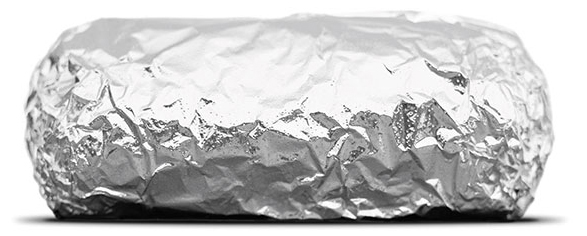Field Research: Day 79
On my third day at Chipotle, we listened to loud rap music and I was—again—asked to dice a crate of red onions. After finishing, I brought my dirty knife to the dish pit. I scrubbed it clean and accidentally cut my finger. I tried to avoid dripping blood everywhere. I found a cabinet of basic medical supplies, put some gauze on the wound, and rolled a latex finger condom down to the knuckle. The bleeding did not stop and the condom slowly inflated like a bright red balloon. One of the line cooks—a very friendly young man from Baltimore—looked at the ballooning bladder on my finger and said, “When you take a dirty knife to the dish pit, just rinse it under some water. You don’t have to scrub it or anything.”
I reminded him of the three-sink method and the rules about scrubbing, rinsing and then fully submerging in sanitizer for at least thirty seconds.
“If you do that,” he responded, “you are going to cut yourself.”
Field Research: Day 81
After a few weeks at Chipotle I became a decent front-of-house worker. It was my job to greet customers, begin taking orders, and scoop rice and/or beans onto hot tortillas. I was fast, but as soon as a line of customers started forming, the manager would always tap me on the shoulder and ask me to step aside and make room for our star team member: an exceedingly pregnant Latina who spoke no English. She had a warm smile and she had memorized all the vocabulary of our menu items. Customers often ordered through long-winded sessions of oversharing: “I know this is lame—I always get the lamest burritos—but could you get me a kind of small burrito with only cheese and black beans, because my boyfriend is a vegetarian and he doesn’t like it when I eat meat.”
Our pregnant friend would then deftly sift through this word soup and begin rolling a burrito with only cheese and black beans. This worked perfectly—and always made me feel superfluous—until one day when I looked over and a very agitated young homeless person was screaming, “Brown beans! Brown beans!”
He had a heavy and off-putting brow—reminiscent of a Neanderthal or perhaps a Norwegian—and a serious under bite. This cheese doodle-shaped head accentuated his menacing gestalt. He kept screaming and banging on the glass. Here, it is important to note that proper menu terminology is “pinto beans”. Consequently, my pregnant co-worker was gobsmacked when he said “brown beans”. My heart cried out in glee: A customer has finally gone off-script. This was my time to shine. I walked over and helped the man order three bowls of beans. No rice. No meat. No vegetables. I brought his bowls to the salsa station and he mumbled, “No salsa. Just beans.”
We arrived at the cash register and he asked for a juice box. He drank it before paying and then said, “Yes. I will have seventeen more juice boxes.”
We counted out seventeen juice boxes and put them on a tray. The purple-haired goth girl working at the cash register rang up his total bill. He then reached into his underwear and took out some money. He unwrinkled thirty-something-dollars and handed it to the goth girl. She slowly—carefully, unsurely—reached out her hand and accepted his underwear money. She then counted out his change and he returned it to his underwear.
Field Research: 92
I woke up late, entered the restaurant, clocked in and made a hundred burritos for a long line of people. Then the line dwindled and one of the assistant managers approached me to tell me that my serving sizes were off.
“You should serve customers four ounces.” Everything at Chipotle is four ounces: four ounces of chicken, pork, beef, tofu. Four ounces of brown rice. Four ounces of black beans.
“Here,” said the assistant manager, “Fill this bowl with four ounces of barbacoa.” Having grown up with the metric system, this was all a bit challenging. I picked up the tongs and approximated the perfect pinch of meat. “No,” she interrupted, “That is way too much.” She took out a measurement cup and showed me the exact volume of four ounces. I practiced a few more times and then I asked, “What about this? Is this four ounces?” The assistant manager became visibly annoyed and said, “No. Do I need to go get the scale?”
I found this even more confusing, so I asked, “I thought we were talking about fluid ounces—a measurement of volume—are you talking about ounces as a measurement of weight?” She disregarded my questioned and yelled, “We are talking about four ounces!”
After a few more minutes of repetition, I finally realized: Americans don’t really understand their own system of units. Also, people don’t really know that they don’t understand. The American system of measurements is called the “US customary system.” 1 gallon is 4 quarts is 8 pints is 16 cups is 128 fluid ounces. 1 barrel of oil is equal to about 42 gallons. Your average civilian has not memorized these conversions. They just wing it. They are happy just winging it. This probably makes it more difficult to enter the world of science. A bushel of potassium nitrate. A dry pint of acetone peroxide.

In America, the threshold for acquiring a basic grasp of the world is fairly high. In Sweden, it is very low. Even a dense and under-educated Swede has a basic grasp of the metric system. 1 liter is 10 deciliters is 100 centiliter is 1000 milliliter. There is very little learning necessary. Kilo. Deci. Centi. Milli. The system does all the math for you. Base of 10. User friendly.
This can be compared to China and its writing system. In China, a person with only 2-3 years of education will not be able to read or write. They have not cleared the threshold. Whereas a Westerner with only 2-3 years of schooling should be able to do basic reading and writing. Fortunately, China has made a very deliberate effort to make sure that everyone clears the threshold. In America, this is seen as less important.
In the seventies, America was slated to begin a transition over to the metric system. They even began printing road signs with distances denoted in kilometers. Eventually, this transition was nixed by Ronald Reagan. Because it wasn’t American enough. This conflict remains unresolved. A couple of years ago, in Wisconsin, some of the state’s deadliest highway intersections were turned into roundabouts because research shows that this is safer. Fatalities went down. Traffic congestion was eased. Then hard-line Republican Scott Walker was elected governor in 2010. He denounced the roundabouts for not being American enough. He said this was all part of the Europification of Wisconsin. He ordered the destruction of the roundabouts. Fatalities went back up. But some Americans are consistently on the right side of history. For example, Ghostface Killah made a song with Reakwon called Kilo:
All around the world today, the kilo is the measure.
A kilo is a thousand grams, it’s easy to remember.

3 replies on “What I Learned After Moving To America and Getting a Job at Chipotle (part2)”
This is an extremely disturbing and subversive site by someone claiming to be Swedish. It is spreading all sorts of false claims about our great nation: THE UNITED STATES OF AMERICA. The writer is just another smug, elite leftist. He is probably not even Swedish, just a member of the left-wing American establishment. Although there are not many Swedes, especially outside of Sweden, I’ve known some. They’ve all been polite, not like this fellow. (And, on a separate note, they’ve all practiced a high level of personal hygiene). If the contents of this site are not revised or removed, inquiries will be made with the relevant departments. In the meantime, I will be telling everyone I know to avoid this site.
Our center is still working on a report that highlights notable differences between the values of the American “elite leftist” and our values (Northern European Social Democrat). But you are correct, we are more in line with Barack Obama than Donald Trump.
This is very true. Americans don’t know the hodge-podge of units they claim to support. For a manager to act that way, I would have gone all over social media with that story and not hesitated to mention her name.